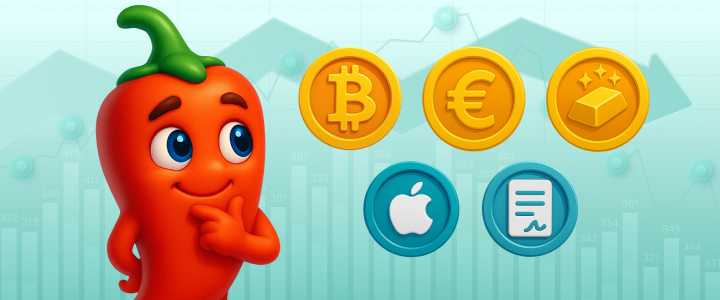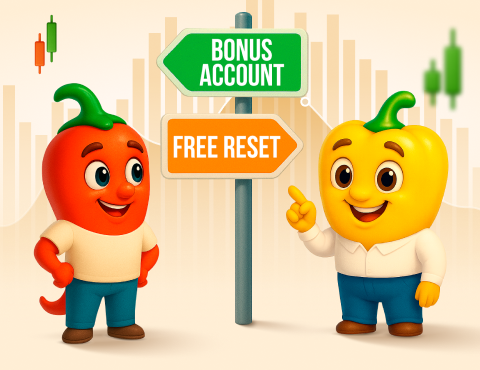Which markets do prop traders focus on? Stocks, futures or cryptocurrencies?
31.07.2025
Formación
The financial world is huge. Stocks, commodities, currencies, cryptocurrencies. It would take years to study each market. For academic economists, this is acceptable. But a practical trader needs a shorter path.

The key to choosing a direction may be the "efficient market hypothesis". In the 1960s, it was formulated by Nobel Prize winner in economics Eugene Fama. According to this hypothesis, in an efficient market, all information is taken into account immediately at the moment it appears. There is no insider information.
If such a market existed, trading on it would make no sense. Any new information on the economy, politics, behavior of market participants was reflected in prices immediately. Everyone's chances were 50.0% to 50.0%. Taking into account commissions and spreads, any systematic trading would only bring a negative result.
Someday, everything will be like this. This requires full digitalization. Open access to all information. And the dominance of strong AI in the markets. Some will say that all this already exists. But the facts are stubborn. They say otherwise. We are still very far from a fully efficient market.
There are other major examples. The US elections. Donald Trump's tariffs. Budget mistakes in the British government. There are thousands of such moments. Millions of smaller ones. They all point to the same idea. The efficiency of financial markets is not complete. Moreover. Each has its own.
The degree of market inefficiency determines its potential profitability. Inefficiency leads to deviations from the fair price. Gives rise to volatility. And those very trading moments when traders are too optimistic or, on the contrary, pessimistic.
One of the most efficient is the American stock market. Thousands of analytical agencies work here. Tens of thousands of investment funds. Millions of retail traders. They automatically sift through all the information. And then play it back. For any attempt at insider trading, a large prison term and huge fines.
Next comes the commodity market. It is also heavily regulated. The efficiency is high. In addition, such large segments as oil or gas have material grounds. Pricing here is controlled by the largest producers. It is often said that oil prices are almost impossible to predict.
The third place goes to the foreign exchange market. Information on it is also carefully sifted. But the foreign exchange market is too big to quickly rearrange quotes. Daily turnover can reach $6.0 trillion. It is very difficult to move this mountain. The efficiency here is average.
The most inefficient is the crypto market. This is the Wild West of the financial world. Regulation is just emerging here. All available practices of price manipulation are used. Hence the record volatility. Huge profitability and risks.
A prop trader can go to the crypto market. With a good trading system, you can get the maximum profitability there. However, in practice, most people take a safer path.
A prop trader has strict risk management requirements. They cannot be violated. Plus, not all prop companies encourage wild swings. They also need stability. Therefore, prop traders most often trade currencies. In second place are derivatives on raw materials and stock indices. And cryptocurrency is in last place.

The key to choosing a direction may be the "efficient market hypothesis". In the 1960s, it was formulated by Nobel Prize winner in economics Eugene Fama. According to this hypothesis, in an efficient market, all information is taken into account immediately at the moment it appears. There is no insider information.
If such a market existed, trading on it would make no sense. Any new information on the economy, politics, behavior of market participants was reflected in prices immediately. Everyone's chances were 50.0% to 50.0%. Taking into account commissions and spreads, any systematic trading would only bring a negative result.
Someday, everything will be like this. This requires full digitalization. Open access to all information. And the dominance of strong AI in the markets. Some will say that all this already exists. But the facts are stubborn. They say otherwise. We are still very far from a fully efficient market.
Facts
- On March 4, 2025, Friedrich Merz announced amendments to the German constitution to increase military spending. The EURUSD pair played out this news for 6 trading days. Until March 11. During this period, the rate increased by 3.6%. With full market efficiency, the growth should have occurred immediately after the announcement.
- On October 13, 2023, the deadline for filing an appeal by the Securities and Exchange Commission (SEC) to challenge the conversion of the Grayscale trust fund into a spot Bitcoin ETF passed. The next day, it became clear to everyone that the ETF would be approved in the near future. And so it happened. And Bitcoin grew from October 14, 2023 to March 14, 2024, by 169.0% in 5 months. This also does not look like an efficient market.
There are other major examples. The US elections. Donald Trump's tariffs. Budget mistakes in the British government. There are thousands of such moments. Millions of smaller ones. They all point to the same idea. The efficiency of financial markets is not complete. Moreover. Each has its own.
Who is more inefficient?
The degree of market inefficiency determines its potential profitability. Inefficiency leads to deviations from the fair price. Gives rise to volatility. And those very trading moments when traders are too optimistic or, on the contrary, pessimistic.
One of the most efficient is the American stock market. Thousands of analytical agencies work here. Tens of thousands of investment funds. Millions of retail traders. They automatically sift through all the information. And then play it back. For any attempt at insider trading, a large prison term and huge fines.
Next comes the commodity market. It is also heavily regulated. The efficiency is high. In addition, such large segments as oil or gas have material grounds. Pricing here is controlled by the largest producers. It is often said that oil prices are almost impossible to predict.
The third place goes to the foreign exchange market. Information on it is also carefully sifted. But the foreign exchange market is too big to quickly rearrange quotes. Daily turnover can reach $6.0 trillion. It is very difficult to move this mountain. The efficiency here is average.
The most inefficient is the crypto market. This is the Wild West of the financial world. Regulation is just emerging here. All available practices of price manipulation are used. Hence the record volatility. Huge profitability and risks.
Safe choice of a prop trader
A prop trader can go to the crypto market. With a good trading system, you can get the maximum profitability there. However, in practice, most people take a safer path.
A prop trader has strict risk management requirements. They cannot be violated. Plus, not all prop companies encourage wild swings. They also need stability. Therefore, prop traders most often trade currencies. In second place are derivatives on raw materials and stock indices. And cryptocurrency is in last place.
Popular articles
Formación
Noticias
Formación
Formación
Noticias
¡Torneo de lucha de Peppers en SpiceProp!
17.07.2025
Comentarios
Formación
Formación
Formación
blog_promo
blog_promo
Formación
Formación
blog_promo
Comentarios
Comentarios
Formación
Noticias
Formación
What is Prop Trading and How Does it Work?
29.05.2025
Noticias
Comentarios
Formación
Forex vs. Juegos de azar
22.05.2025
Noticias
Comentarios
Formación
Formación
Noticias
Formación
Comentarios
Noticias
Comentarios
Formación
¿Cómo analizar tu informe de trading?
24.04.2025
Comentarios
Formación
Noticias
Noticias
Formación
Noticias
Comentarios
Comentarios
Comentarios
Noticias
Comentarios
Comentarios
Noticias
Comentarios
Comentarios
Comentarios
Comentarios
Noticias
Celebra el Año Nuevo Chino con SpiceProp
05.02.2025
Noticias
Noticias
Comentarios
Comentarios
Dionisie Florea: logrando el éxito comercial
13.01.2025
Noticias
Noticias
Noticias
Noticias
Noticias
Noticias
Entrevista
Comentarios
Noticias
Noticias
Noticias
Noticias
Comentarios
Comentarios
Marcel Surd: Ganó €8937 en dos semanas
14.11.2024
Noticias
Noticias
Noticias
Noticias
Noticias
Noticias
Noticias
Formación
Financiamiento inmediato: ¿cómo funciona?
03.09.2024
Formación
Comentarios
Entrevista
Noticias
Comentarios
Formación
Noticias
Noticias
Formación
El trabajo de un prop trader. ¿Cómo empezar?
29.07.2024
Comentarios
Entrevista
Formación
Noticias
Comentarios
Viktor Ovcharov: €1990 en una semana
14.07.2024
Formación
¿Cómo convertirse en un prop trader?
10.07.2024
Noticias
Formación
Acepte el riesgo o cómo gestionarlo
03.07.2024
Noticias
Noticias
Noticias
Comentarios
Noticias
Comentarios
Noticias
Noticias
Entrevista
Noticias
Formación
Introducción al análisis fundamental
06.01.2024
Formación
Las cinco reglas de un trader exitoso
30.12.2023
Formación
Cómo dominar sus emociones en el trading
12.12.2023
Formación
¿Cómo construir una estrategia comercial?
11.12.2023
Formación
¿Qué es proptrading?
11.12.2023
